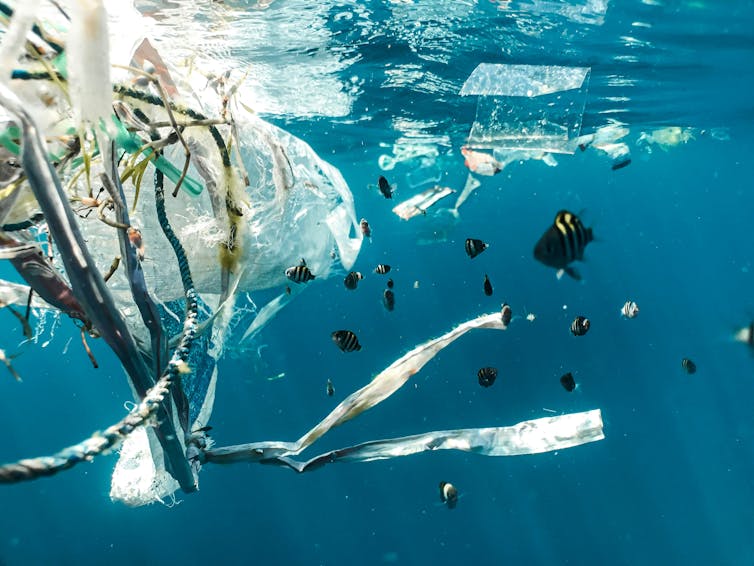By Amélie Châtel, Université catholique de l’Ouest; The Conversation

Plastic that enters the marine food chain can end up on our plates. TravisYewell/Unsplash
It’s no secret: when we savour a delicious piece of fish or a platter of seafood, we’re not just consuming valuable omega-3s and vitamin D. Alongside these benefits come less appetising elements — countless micro- and nano-plastics.
These plastic particles, measuring less than 5 millimetres, enter our oceans through human waste and penetrate the food chain. According to an Ifremer study, around 24,400 billion microplastics are floating on the ocean’s surface. These particles are found in all marine organisms — from microalgae to fish, which occupy higher levels of the food chain. This phenomenon not only threatens marine ecosystems but also raises concerns about potential risks to human health.
What exactly do we know about the accumulation of these pollutants in marine life and the dangers they pose to human health?

Marine organisms bioaccumulate micro- and nano-plastics that humans discharge into the sea. Naja Bertolt Jensen/Unsplash, CC BY-NC-SA
Micro- and nano-plastics: an invisible threat
Since the 1950s, plastic production has grown exponentially, reaching 58 million tonnes in Europe in 2022 alone. This has led to massive amounts of waste.
Over time, wind, waves, sunlight and microorganisms break down larger plastic waste into microplastics (1–5 mm) and nanoplastics (smaller than 100 nanometers), which now contaminate all parts of the environment, including the air, soil and water.
[There are already more than 120,000 subscriptions to The Conversation newsletters. Subscribe today to better understand the world’s major issues.]
The process by which these plastics accumulate in organisms across different levels of the food chain is known as “bioaccumulation”.
Research from our laboratory reveals that in aquatic environments, micro- and nano-plastics are ingested by a wide range of species — from microalgae at the base of the food chain to top predators like eels.
The impact on marine life
These ingestions have serious consequences. Studies show that microplastics can cause toxic effects in marine animals.
For instance, in mussels, microplastics can block digestive systems, activate immune responses, cause DNA damage and interfere with the expression of genes essential to various cellular functions.
The severity of these effects depends on the plastics’ size, composition, degree of degradation and any harmful chemical additives they may contain.
Plastics often contain high levels of phthalates, which are endocrine disruptors. These chemicals can interfere with hormonal systems, posing risks not just to marine life but potentially to humans as well.
Risks to human health
Plastics ingested by marine animals inevitably make their way into our food supply.
Frequent seafood consumers are estimated to ingest thousands of microplastic particles annually. Although research on the precise health effects on humans is ongoing, some troubling hypotheses have emerged.
Once inside the human body, these particles may cause damage similar to that observed in fish.
Studies on human cells indicate that micro- and nano-plastics can disrupt cellular functions in ways akin to the effects seen in marine organisms. Scientists are particularly concerned about the toxic impacts of plastic additives.
Additionally, micro- and nano-plastics can act as carriers for pathogens or bacteria, potentially increasing the risk of infectious diseases.
The urgency to tackle plastic bioaccumulation in the food chain cannot be overstated. By taking swift action to limit plastic usage and improve recycling technologies, we can slow the progression of this environmental and health crisis.

This article is part of the Science Festival (October 4–14, 2024), for which The Conversation France is a partner. This year’s theme, “Ocean of Knowledge,” highlights critical marine issues. Learn more about the festival at Fetedelascience.fr.![]()
Amélie Châtel, Professeur en Ecotoxicologie aquatique, Université catholique de l’Ouest
This article is republished from The Conversation under a Creative Commons license. Read the original article.





















